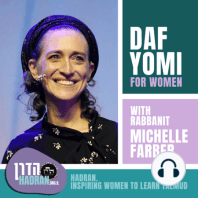39 min listen

Bava Kamma 99 - Rosh Chodesh Adar 1 - February 9, 30 Shvat
Bava Kamma 99 - Rosh Chodesh Adar 1 - February 9, 30 Shvat
ratings:
Length:
48 minutes
Released:
Feb 9, 2024
Format:
Podcast episode
Description
Study Guide Bava Kamma 99 This week’s learning is dedicated by Phyllis & Yossie Hecht in loving memory of Phyllis’s father’s, HaRav Yerachmiel Binyanim ben Zalman Tzvi Witkin on his 15th yahrzeit yesterday. “Jerry Witkin, as he was affectionately known to all. He was a Yosher Lev, חבר לכל ראיך, שמח בחלקו, and a man who personified במקום שאין איש השתדל להיות איש. My father was an activist and a true source of nachat to his friends, family and klal Yisrael. Dad's legacy of 6 children, 28 grandchildren and ever-growing great-grandchildren – all Torah Jews continues to live on. You are so missed and we have been so blessed. Yehi Zichro Baruch.” Rav Asi holds that if one gives wood to a carpenter to build a closet and builds it but breaks it before giving it back to the owner of the wood, the carpenter is not responsible for the broken item because the object created (the enhancement of the raw materials) is considered in their possession and the carpenter is like a seller who sells the enhancement back to the original owner. Is Rav Asi's opinion agreed upon by everyone or is there another opinion? In attempting to see if tanaim debated this issue, an argument between Rabbi Meir and the Rabbis is brought regarding a woman who says to a goldsmith to make her jewels with her materials and she will be betrothed to him with those jewels. The Gemara suggests four different possibilities as to what the principles are that stand behind each of the opinions and what is the debate about. Shmuel teaches that if a slaughterer makes a mistake and makes the animal not kosher, he/she is responsible whether or not it was done for free or for pay. Rabbi Yochanan disagrees and distinguishes between one who gets paid and one who does it for free. He compares it to laws of shomrim and just as one who gets paid to watch an item assumes more responsibility in the event of theft or loss, the same holds for the slaughterer or any professional. However, if there is no compensation, then they are like a shomer chinam who watches the item for free and is not obligated in a case of theft or loss. Is a professional damaging an item more similar to laws of shomrim because the item was given to the professional by the owner? Or is it more like adam hamazik - a person who damages another's item, in which case he is obligated even for unintentional damage, oness.
Released:
Feb 9, 2024
Format:
Podcast episode
Titles in the series (100)
Niddah 71: A woman who dies – do we treat her clothes as clothes of a niddah (and require purification) or not? Why do Beit Shammai think we do? What is the status of blood that comes out of a woman as she is dying – does it carry impurities of niddah or of... by Daf Yomi for Women - Hadran